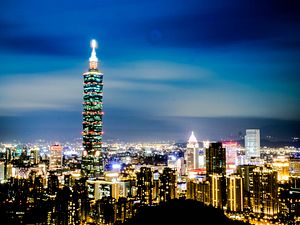In recent months, Americans have witnessed the extraordinary leadership of state and local leaders—despite the lack of one synchronized national strategy. Debates over re-opening drag on, and tensions between the Trump administration and governors simmer. Meanwhile, the death toll has passed 100,000, and confirmed cases exceed 2 million.
In contrast, Taiwan has succeeded, not in flattening the curve—but completely suppressing it. A vibrant democracy with the population of Massachusetts, Virginia, and Indiana combined, Taiwan has reported a mere 443 cases and 7 deaths and has since stepped up to help globally. As U.S. Secretary of State Mike Pompeo pronounced, “Taiwan’s openness and generosity in the battle against COVID-19 is a model for the world.”
At the same time Taiwan’s successes have been lauded, its capital, Taipei, has been an example of the powerful intergovernmental apparatus that has enabled coordination between national and local leaders—the driver of the Taiwan’s success. While Twitter feuds have underscored divisions between America’s governors and its president, Taiwan’s city and central governments have collaborated in systemically implementing policies. Thus, as America’s leaders take their next steps in fighting coronavirus and re-opening the economy, they should look to Taipei as an example of enlightened governance.
So how did Taipei achieve this remarkable outcome? Decisive leadership and policy implementation at all levels. Despite unavoidable frictions between tiers of government and across party lines, the Taipei city government worked hand-in-hand with national leaders to execute policies locally.
With a population larger than a third of U.S. states, Taipei was the city in Asia perhaps most vulnerable to the pandemic. Its crowds of foreign tourists, frequent business visitors, and ties to major Chinese cities made mass infection appear likely—if not inevitable.
Yet the city defied conventional wisdom. Today, schools hold classes, trains and buses still run on schedule, and retailers from malls to bubble tea shops remain open for business. Life essentially proceeds as normal.
After border controls required visitors to undergo 14-day quarantine, local officials—district by district—monitored the 30,000 individuals under quarantine in Taipei using an advanced tracking system. Concurrently, the city’s Health Department designated over 20 hotels as quarantine locations, circulated safety protocols for hotel staff, and negotiated rates and subsidies to support the local tourism industry in a public-private partnership.
On the Taipei Metro, which serves two million trips daily, the city enacted rigorous hygiene procedures, disinfecting stations and surfaces every four hours. Following national guidance, the city mandated masks on subways and installed infrared imaging systems to monitor passenger temperatures. To protect workers and commuters, transit staff have their temperatures taken daily and work shorter shifts.
Taipei also created local epidemic hotlines to support the national CDC. With one phone call, quarantined individuals could request designated city taxis to whisk them to the nearest hospital for non-COVID-19 health concerns. To mitigate adverse economic impacts, the city provided rent reductions and tax cuts to small businesses. And for residents with family in quarantine, the city government offered subsidies to alleviate financial burdens.
Notably, these measures were implemented in coordination with other leaders, including the mayor of neighboring New Taipei City, who hails from one rival political party, and Taiwan’s president, who hails from another. These partnerships cut across partisan lines and put aside political squabbling to achieve one common goal: prioritizing public health.
But Taipei didn’t stop there. Recognizing that transparency is the bedrock of democratic governance, the city created multi-lingual resources distributed on social media. And once proven effective in Taipei, the lessons learned and data collected were shared with the international community. To date, Taipei has reached out to dozens of major cities across the world.
To be sure, the lion’s share of credit for Taiwan’s success goes to the swift decision-making of the central government, the expertise of Taiwan’s front-line health professionals, and the transparent and data-driven approach spearheaded by its President. From early border controls to PPE production, Taiwan’s national leaders, including its epidemiologist Vice President, acted quickly.
But policy pronouncements alone accomplish little. Executive proclamations and press briefings from a presidential podium don’t curb infections. Instead, contact tracing requires real staff; quarantine requires actual rooms; and public transport, which undergirds the economy, requires healthy workers. In short, national policy must be accompanied by local coordination and implementation to be effective.
When mask production ramped up, Taipei partnered with the Health Ministry to install mask vending machines for its residents. To prepare for a potential lockdown, city officials conducted tabletop exercises and interagency pandemic drills with various national-level ministries.
Of course, we should harbor no illusions. In any healthy democracy, local and national leaders will disagree—and even compete. But as America considers next steps, leaders should strengthen interstate and intercity communication, bridge party divisions to support local economies, and proactively share lessons and data.
What enabled Taiwan to succeed where others have failed? The cohesion of its institutions and its democracy. Decisions followed vigorous debate. Policies were implemented with active participation from local leaders. The result has been short of a miracle, making Taiwan not just a model of coronavirus response but also an archetype of democratic governance.
So, in a world of increasingly dysfunctional democracy, as America’s leaders continue the quest to re-open, governors and mayors can learn from Taipei. With time, hopefully, Washington will too.
Ko Wen-je is the 23rd Mayor of Taipei, serving since 2014, and Chairman of the Taiwan People’s Party. He was previously a trauma surgeon and professor of medicine at National Taiwan University Hospital.
Christopher Li is a researcher on foreign policy and technology at the Belfer Center for Science and International Affairs at Harvard University.

































